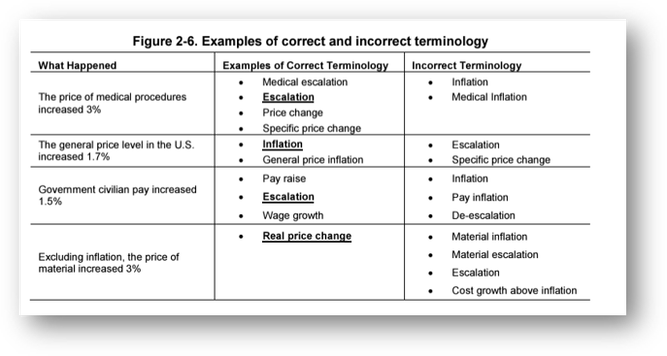Escalation vs Inflation – Construction Estimates


Preface:
Often in pricing, it is required to forecast the Projects Budgets and/or estimates, from the time, pricing has started and to the end of project handover or by end of life cycle of that particular project.
The terminology used by cost experts is either inflation or escalation. Here we will understand the difference between the two; and conclude, what terminology to be appropriately used, and when.
Let us start with the basic difference between Inflation and Escalation.
Inflation is defined as follows:
[1] “An Economy wise increase in average price level."
a) [2] “Inflation is the rate of increase in prices over a given period of time. Inflation is typically a broad measure, such as the overall increase in prices or the increase in the cost of living in a country. But it can also be more narrowly calculated—for certain goods, such as food, or for services, such as a haircut, for example. Whatever the context, inflation represents how much more expensive the relevant set of goods and/or services has become over a certain period, most commonly a year.”
b) Escalation on the other hand [1] “reflects changes in the price of specific goods and services”. [1] “Inflation refers to a rise in the general price level over time, which is an economywide average over all goods and services transacted. Inflation represents a decrease in the value of money (i.e., the dollar), due to an increase in the supply of money and credit relative to available goods, resulting in a rise in the general price level.”
Hence, inflation is rise of price due to the combination of economic factors, such as supply and demand, rate of production, currency devaluation etc, applied on all domestic products, where as Inflation is one of the factors that impacts the escalation. Escalation in construction projects is focused on list of materials specific to that construction project, and the impact on rates, in future years, depends on technological changes, environmental polices, political situation, import and export duties of any particular goods or services.
So the forecast of any construction projects have two factors to consider, Escalation and Inflation.
Plus, there is another term used in economy, referred to as, “Real Price Change”. This is defined as follows:
[3] “While inflation affects all prices in the same proportion, prices for specific goods and services may change at different rates due to real price change (sometimes abbreviated RPC). Positive real price change indicates that the item has become more expensive relative to an economy-wide basket of goods and services, whereas negative real price change indicates it has become relatively less expensive.
Real price change may include a combination of these and other forces depending on the context of the good or service within the economy over time.
Market shifts
Changes in the supplies of specific materials
Changes to cost of doing business (e.g., overhead rates), for either contractors or the government
Economies or diseconomies of scale
Changes in the mix of the workforce, such as labor categories or skill levels
Changes to inputs to production
Rate effects and learning effects
Technological change, such as increased automation of a production process
So the Real difference between Inflation, Escalation and Real price change can be understood from the [3] table below.


Hence, whether the forecast of construction project is to be used in calculating Tender Price Indices ( which relates to clients expenses in building a project) or Building cost indices (when contractor calculates its inflation and/or escalation), the correct understanding of Inflation and Escalation, will help to achieve a reasonable forecast, without loosing margins in wrong cost heads!!
[1] Inflation And Escalation Best Practices For Cost Analysis Office Of The Secretary Of Defense USA
[2] International Monetary Fund
[3] Inflation And Escalation Best Practices For Cost Analysis Office Of The Secretary Of Defense USA

